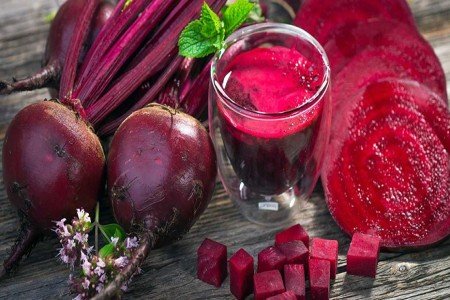The Nutritional Powerhouse: Health Benefits of Beets
Beets, also known as beetroot, are a vibrant and nutritious vegetable that have gained popularity due to their numerous health benefits. Packed with essential vitamins, minerals, and antioxidants, beets not only add color to your plate but also provide a wide range of potential health advantages. Let’s explore the nutritional profile and various health benefits of this nutrient-dense vegetable.
The Nutritional Profile of Beets
Beets are a low-calorie vegetable that is rich in essential nutrients. They are an excellent source of folate, manganese, potassium, and vitamin C. Additionally, beets contain smaller amounts of iron, magnesium, and vitamin B6. This unique nutritional profile makes beets a valuable addition to a well-balanced diet.

High in Essential Vitamins and Minerals
One of the standout features of beets is their high vitamin and mineral content. Folate, found abundantly in beets, plays a crucial role in cell growth and reproduction. Manganese is essential for bone health, metabolism, and antioxidant function. Potassium helps regulate blood pressure and supports proper muscle and nerve function. Lastly, vitamin C is a powerful antioxidant that boosts the immune system and aids in collagen production.
Beets: A Great Source of Dietary Fiber
Beets are an excellent source of dietary fiber, with both soluble and insoluble fibers present in their composition. Soluble fiber helps regulate blood sugar levels, lower cholesterol, and promote a healthy digestive system. Insoluble fiber adds bulk to the stool, preventing constipation and supporting regular bowel movements. Including beets in your diet can contribute to overall digestive health.
Beetroots: The Antioxidant Powerhouse
Beetroots contain high levels of antioxidants, which are compounds that protect our cells from damage caused by harmful free radicals. The pigment responsible for their vibrant color, betalains, is a group of antioxidants with powerful anti-inflammatory and detoxifying properties. These antioxidants help reduce oxidative stress in the body and may contribute to a lower risk of chronic diseases such as heart disease and certain types of cancer.
Beets and Their Potential Anti-inflammatory Properties
Inflammation can be both beneficial and harmful to our bodies. While acute inflammation is a natural response to injury or infection, chronic inflammation can lead to various diseases. Beets have been found to possess anti-inflammatory properties due to their betalain content. Regular consumption of beets may help reduce inflammation and alleviate symptoms associated with conditions such as arthritis.
Promoting Heart Health with Beets
Beets have been linked to improved heart health due to their unique combination of nutrients. The high levels of nitrates found in beets are converted to nitric oxide in the body, which helps relax and dilate blood vessels, leading to better blood flow and lower blood pressure. Additionally, the antioxidants in beets help reduce oxidative stress, a common factor in cardiovascular diseases.
Beets: A Natural Detoxifier
Beets are often referred to as natural detoxifiers due to their ability to support liver function. The betalains in beets aid in detoxification by assisting the liver in breaking down toxins and excreting them from the body. Including beets in your diet can help promote a healthy liver and enhance the body’s natural detoxification process.
Can Beets Boost Brain Function?
Emerging research suggests that beets may have cognitive benefits. The nitrates in beets can increase blood flow to the brain, enhancing oxygen and nutrient delivery. This improved blood flow may have a positive impact on cognitive function, including memory and decision-making. However, further studies are needed to fully understand the potential brain-boosting effects of beets.
The Role of Beets in Enhancing Athletic Performance
Beet juice has gained popularity among athletes due to its potential to enhance exercise performance. The nitrates in beets can improve oxygen utilization, leading to increased endurance and reduced fatigue during physical activity. Athletes may benefit from consuming beet juice or incorporating beets into their pre-workout meals to optimize their performance.
Beets for Blood Pressure Management
High blood pressure is a prevalent health concern, and lifestyle modifications play a crucial role in its management. Beets have been found to have a positive impact on blood pressure due to their nitrate content. Regular consumption of beets or beet juice has shown to lower blood pressure levels, making them a natural and nutritious addition to a heart-healthy diet.
Beets: A Potential Ally Against Anemia
Anemia, characterized by a deficiency of red blood cells or hemoglobin, can lead to fatigue and weakness. Beets can potentially help combat anemia due to their iron content. While the iron in beets is not as easily absorbed as iron from animal sources, consuming beets with vitamin C-rich foods can enhance iron absorption and contribute to the prevention and management of anemia.
Adding Beets to Your Diet: Tips and Recipes
Including beets in your diet can be an exciting and flavorful experience. Beets can be enjoyed raw, roasted, boiled, or even pickled. They can be used in salads, smoothies, soups, or as a side dish. To maximize their nutritional benefits, it is recommended to consume beets in their whole form, as juicing may remove some of the beneficial fiber. Experiment with beet recipes to find delicious and nutritious ways to incorporate this vibrant vegetable into your meals.
Beets are not only a vibrant addition to your plate but also a nutritional powerhouse with a range of potential health benefits. From providing essential vitamins and minerals to supporting heart health, promoting brain function, and aiding in detoxification, beets offer numerous reasons to include them in your diet. Whether you enjoy them raw, roasted, or in various culinary creations, beets are a versatile and delicious addition to a well-balanced and nutrient-rich diet. So, why not give these nutritional gems a try and experience their potential health-enhancing effects for yourself?